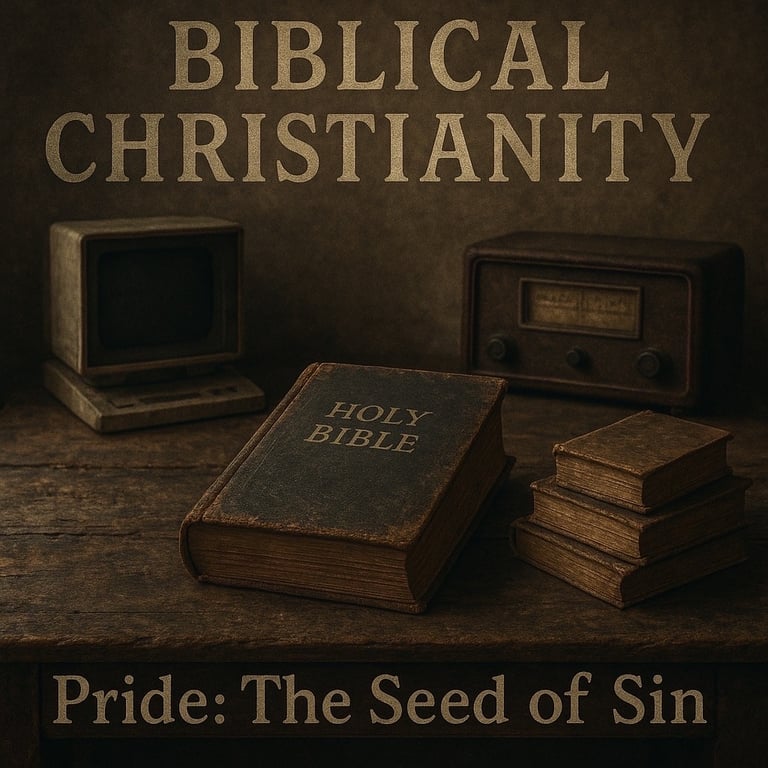

Chapter 4: Pride in Every Sin
We like to rank sins.
We talk about the “big ones”: murder, adultery, theft.
And the “small ones”: gossip, grumbling, envy.
But God looks deeper—
not just at what we’ve done,
but why we do it.
And underneath them all,
there is one common root.
Pride.
More Than Just One Sin
Pride is not one sin among many.
It is the soil where all sin grows.
Lust?
“I deserve this.”
“I know what’s good for me.”
Pride.
Greed?
“I need more than God has given.”
“I will not be content.”
Pride.
Envy?
“They have what I should have.”
“I should be in their place.”
Pride.
Wrath?
“How dare they treat me this way.”
“I must make them pay.”
Pride.
Even fear?
“What if I lose control?”
“What if God doesn’t come through?”
Still pride—
because it places trust in self rather than surrender to God.
The Subtle Ones Too
Gossip?
Pride disguised as superiority.
It lifts me up by putting someone else down.
Grumbling?
Pride that says,
“I know how this should be going better than God does.”
Bitterness?
Pride refusing to release a debt.
“I was wronged—and I will be the judge.”
Even apathy can be pride.
Because it says,
“I don’t need to care. It doesn’t concern me.”
The Mirror of the Commandments
God gave Ten Commandments.
They were meant to teach holiness—
but also to expose the heart.
Behind every broken commandment,
you’ll find pride.
Let’s walk through them:
“You shall have no other gods before Me.”
→ Pride says: “God isn’t enough. I need another authority—my own, perhaps.”“You shall not make idols.”
→ Pride says: “I’ll reshape God into something I control or prefer.”“You shall not take the Lord’s name in vain.”
→ Pride says: “I can treat God’s name casually—because I don’t fear Him.”“Remember the Sabbath and keep it holy.”
→ Pride says: “I don’t need rest. I don’t need His rhythm. I know better.”“Honor your father and mother.”
→ Pride says: “I’m wiser than those who raised me. I don’t owe them respect.”“You shall not murder.”
→ Pride says: “That life offended me. I’ll be the judge.”“You shall not commit adultery.”
→ Pride says: “I deserve to take what I want—regardless of covenant.”“You shall not steal.”
→ Pride says: “Their possessions should be mine. I’m entitled.”“You shall not bear false witness.”
→ Pride says: “My image matters more than the truth. I’ll twist it if needed.”“You shall not covet.”
→ Pride says: “I should have what they have. God gave me too little.”
The commands reveal God’s authority—
but pride always tries to replace Him.
The Real Issue
We sin not just because we’re weak.
But because we’re proud.
We believe,
“This will satisfy me more than God.”
“I deserve to do what I want.”
“I can handle the consequences.”
Pride says:
“God may have spoken—
but I will decide.”
It’s not just disobedience.
It’s competition.
The Heart of the Pharisee
Pride isn’t just in rebellion.
It’s in religion.
The Pharisee in Luke 18 stood and prayed:
“God, I thank you that I’m not like other men…” — Luke 18:11
He wasn’t thanking God.
He was praising himself.
We can sin in our morality
just as easily as in our mess.
We can keep commandments outwardly,
but do it to glorify self.
Jesus reserved His sharpest words
for those who were proud of their obedience.
The Cross as Exposure
This is why the cross offends.
Because it says:
“You can’t fix this.
You’re not enough.
You are more sinful than you admit.”
Pride recoils.
But grace begins where pride ends.
Only those who know their need
can kneel at the foot of the cross.
What Does It Matter?
If pride feeds every sin,
then we’re not just dealing with behavior.
We’re dealing with identity.
Who’s really in charge of my life?
Whose opinion matters most?
Who gets the final word?
If we don’t tear pride up by the roots,
we will only trade one sin for another.
But when humility takes its place,
sin begins to lose its grip.
Reflection and Questions
What sins in my life might be fueled by hidden pride?
Do I justify sinful thoughts or actions by thinking I deserve them?
When was the last time I confessed—not just the act, but the heart behind it?
Am I proud of my righteousness? Or humbled by God’s mercy?
What would it look like to confront my sin as pride today?

